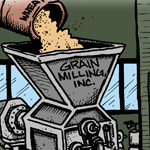Best Food Sources for L-Tyrosine
| Share on Facebook | Share on Twitter | Share on Google+ |
There is a wide variety of tyrosine foods that are good sources of the amino acid called tyrosine. Now that we have mentioned it, you might probably know that tyrosine is one of the important amino acids that are used in protein synthesis.
What is Tyrosine?
As mentioned, tyrosine is an amino acid that has an important role in the structure of almost all the protein found in your body. It is also the precursor of other substances, such as epinephrine, norepinephrine and dopamine. The function of tyrosine amino acid is closely-knit with neurotransmitters and hormones in the body and is essential for normal mental functions. It is also used to create melanin, which is the dark pigmentation that helps shield your skin from the harmful rays of the sun.
Should I Take L-tyrosine with Food
Tyrosine is technically a non-essential amino acid, since the body is able to produce it through another amino acid called phenylalanine. Incidentally though, phenylalanine is considered to be an essential amino acid so they have to be taken in through food sources. Following this line of reasoning, you can conclude that adequate amounts of tyrosine is best taken through foods rich in tyrosine amino acids.
Other Tyrosine Benefits
Aside from the fact that it is important to normalize body and brain functions, tyrosine has been seen to provide various health benefits. Studies have revealed that tyrosine can help fight the symptoms of Parkinson's disease, to alleviate emotional and environmental stress, and to combat depression. Those that take tyrosine supplements claim that it tyrosine helps calm their bodies, increase their energy levels and enhance their libido. Supplements have also been used in the treatment of conditions such as Alzheimer's disease, schizophrenia and dementia.
Foods High in Tyrosine
Fortunately, there are many natural food sources of tyrosine. It is found in most animal and vegetable sources. Foods high in tyrosine include the following:Tyrosine Deficiency
Even if tyrosine is non-essential and that tyrosine is largely available through foods rich in tyrosine, some people have increased needs of tyrosine due to one or several factors, while other suffer from tyrosine deficiency. For example, people going through depression reportedly have low tyrosine levels, as with those who suffer from phenylketonuria (marked by an inability to properly utilize phenylalanine). If you have extremely low levels of tyrosine, you will suffer from a variety of conditions, such as muscle weakness, muscle loss, mood disorders, low protein level and liver damage.
If you are one of those who have increased tyrosine level need or suffer from deficiency of the amino acid, taking in tyrosine through natural tyrosine food sources is not enough. You would need actual tyrosine supplementation through tyrosine tablets or tyrosine powder forms. They are now being sold as individual supplements and sometimes in combination with other amino acids.
-
Skin CareMen Skin Care
-
Free ResourcesFree eBooks
-
Let food be thy medicine, and let thy medicine be food.Hippocrates
-
Featured Health Supplement
 ...a broad spectrum of around 80 of the nutrients that your body needs…including vitamins, minerals, trace elements, antioxidants,
amino acids, neuronutrients, bioflavonoids, carotenoids, herbal extracts, enzymes and other complementary co-factor ingredients.
...a broad spectrum of around 80 of the nutrients that your body needs…including vitamins, minerals, trace elements, antioxidants,
amino acids, neuronutrients, bioflavonoids, carotenoids, herbal extracts, enzymes and other complementary co-factor ingredients.
-



















